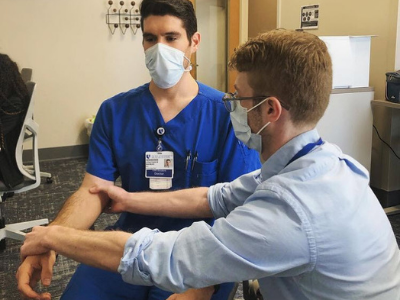
The Clinical Educator Track (CET) prepares residents for a career as clinician educators by offering additional training and mentorship toward developing knowledge and skills in teaching and education, as well as fostering academic scholarship in medical education.
Residents in the CET serve as teachers to junior residents, develop expertise in medical education, learn how to conduct and evaluate medical education research and develop relationships with other clinician educators across specialties and institutions.
The program is co-led by:
- Tara Chandrasekhar, MD
- Colleen Cowperthwait, PhD
- Aishwarya Rajagopalan, DO, MHS
- Christopher Ramsay, MD
- Paul Riordan, MD
Read on to learn more about the specific program components and how to apply.
The didactic curriculum is co-developed and taught by CET faculty and residents in 1.5 hour sessions held monthly on Tuesdays before Residency Academic Half-Day. Examples of topics include teaching skills, development of curricula and educational tools, career development and educational research.
Teaching Opportunities
Venues for teaching practice may include teaching opportunities embedded within residency rotations, outpatient clinics or electives; medical student clerkship seminars; teaching in the medical student pre-clinical psychiatry course; and teaching opportunities for trainees across disciplines or specialties. Residents hone their teaching skills through individual meetings with their CET mentor(s) and direct observation/feedback by CET mentors and peers.
Mentoring Opportunities
CET residents are encouraged to mentor junior residents, medical students interested in psychiatry, pre-medical students and underserved youth in the community. The CET will assist interested residents in getting paired with mentees and will provide mentoring training and support.
CET Mentor
Each resident is paired with their own CET mentor who provides guidance on the residents’ education project, mentorship for career development as a clinician educator, and individual guidance/feedback around teaching activities.
A CET mentor may also help the resident identify teaching opportunities, assist in planning/developing the teaching activity, and/or provide direct observation and feedback of the didactic experience.
Residents may apply to the clinician educator track in July of their PGY1, 2, or 3 year.

“The Clinician Educator Track is led by talented and passionate psychiatrists who are experts in teaching and dedicated to your growth as an educator and life-long learner! After being in the track for three years, I developed the confidence and skills to present at conferences and academic half day, and the portfolio to teach on the wards. There is protected time to participate in the track, and it was more than manageable to do alongside clinical duties.”
— Layne Walker, MD, PGY4 Psychiatry Resident